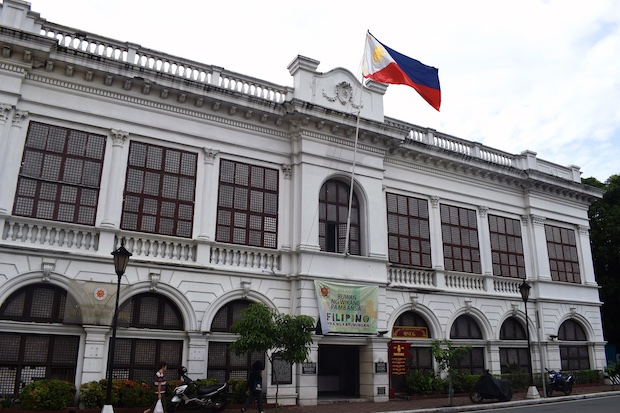
The office of the Komisyon ng Wikang Filipino in Manila. (Photo from the KWF Facebook account)
MANILA, Philippines — Instead of banning five Filipino language books for allegedly being “subversive,” the government should encourage people to read them, according to Tanggol Wika, a coalition of organizations and academic departments on literature and culture.
The group said the five books named by the Komisyon sa Wikang Filipino (KWF) in a memorandum were “subversive” in the sense that they “awaken the consciousness of readers” and help rouse them “to move toward changing society.”
“Instead of threatening the public not to read their books, it’s more appropriate for the government to instead ask them to read them more,” Tanggol Wika said.
‘Worse than Mariteses’
The group, however, also came to the defense of the KWF as it called out the hosts of Sonshine Media Network Inc. (SMNI) and Lorraine Badoy for accusing the agency of being sympathetic with communists over the publishing of “antigovernment” books.
Tanggol Wika said the SMNI hosts were “even worse than gossips and ‘Mariteses’ by citing flimsy sources of information that are surely incredible and baseless.”
“Many books, Filipino or English, would most likely cite from different sources, including works that may be considered revolutionary,” the group said. “But the mere citing of such should not be considered as agreement to or sympathy toward those works but as a typical part of the academic and scholarly process of poring through different related literature.”
Editorial freedom
It added that the KWF was well-known for its rigorous publication of literature that had been peer-reviewed and edited by credible academics.
As a commission with its own charter, the KWF has its own autonomy in its operations and editorial freedom. “No one outside the organization should interfere with the KWF’s publication processes nor should anybody censor and ban the printing and distribution of books published by the KWF,” Tanggol Wika said.
The University of the Philippines’ Department of Speech Communication and Theater Arts also condemned the censorship of Filipino literary works and the red-tagging of academics and writers.
“As an academic institution committed to teaching speech, theater and performance as modes of critical inquiries, creative expressions, and public engagements, we join our fellow artists, communities, and University in defending and fighting for the truth, academic freedom, and integrity,” it said.
In a memorandum dated Aug. 9, the KWF ordered one of its units, the Sentro ng Wika at Kultura, to stop printing five Filipino-language books that supposedly contained “political, subversive and creative literary works with subliminal ideologies that encourage to fight the government.”
The books were “Teatro Politikal Dos” by Malou Jacob, “Kalatas: Mga Kuwentong Bayan at Kuwentong Buhay” by Rommel Rodriguez, “Tawid-diwa sa Pananagisag ni Bienvenido Lumbera: Ang Bayan, ang Manunulat, at ang Magasing Sagisag sa Imahinatibong Yugto ng Batas Militar 1975-1979” by Dexter Cayanes, “May Hadlang ang Umaga” by Don Pagusara, and “Labas: Mga Palabas sa Labas ng Sentro” by Reuel Aguila.
RELATED STORIES
KWF has no power to ban, censor written works – Lagman
CHR to KWF: Be cautious in interpreting Anti-Terrorism Act
Writers’ groups join outcry over KWF move

